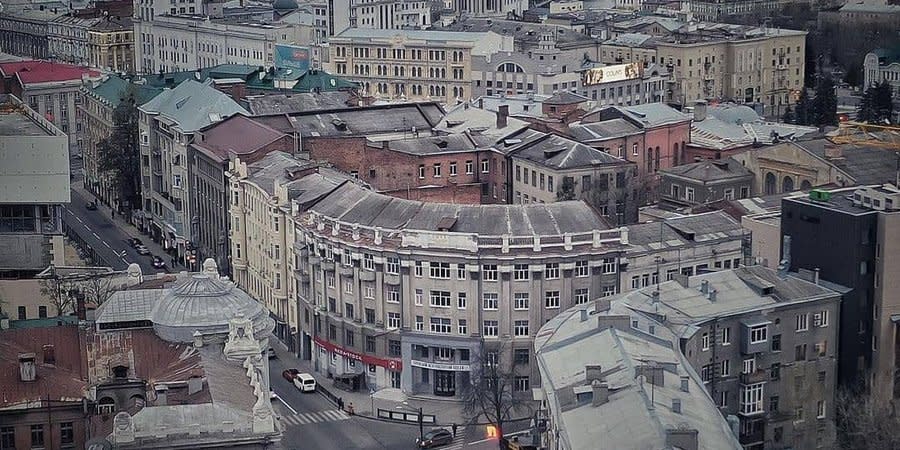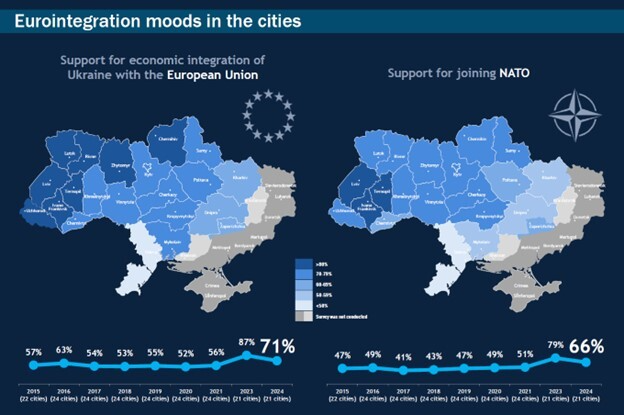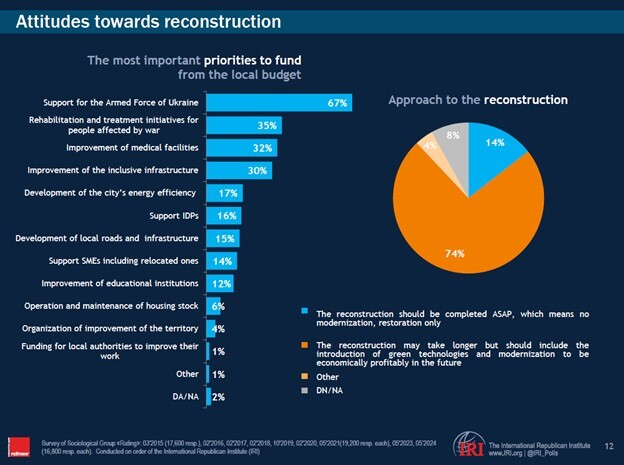Ukrainians show resiliency: Corruption down, support for EU & NATO up, IRI survey finds

Ukrainians are seeing less corruption, show patience in waiting for reconstruction, and show strong support for local governments, NATO, and the EU, according to the latest survey conducted by the International Republican Institute (IRI).
Nearly 17,000 Ukrainians from every oblast center except those under temporary occupation were polled for the survey, conducted by the Rating Sociological Group for the IRI.
Read also: IRI Director Michael Druckman on Ukrainian attitudes during wartime
“Despite a tough winter and a brutal spring, Ukrainians continue to show their resilience,” IRI’s Program Director in Ukraine, Michael Druckman, told NV after the release of the organization’s ninth annual national survey.

He pointed to a broad trust in local governments, a sentiment echoed by IRI’s Senior Director for Eurasia, Stephen Nix.
“This survey demonstrates that local governments and mayors are responding to their citizens’ needs under extreme wartime conditions,” Nix said.
“Mayors and local officials will play an important role in building Ukraine’s future.”
Druckman noted the popularity of administrations in such centers as Kharkiv and Vinnytsia.
Read also: IRI study reveals the happiest cities around Ukraine
Despite a difficult 2024 that has seen multiple air raids and bombings daily for months, the residents of Kharkiv are showing remarkable resilience.
He pointed to a broad trust in local governments, a sentiment echoed by IRI’s Senior Director for Eurasia, Stephen Nix.
“This survey demonstrates that local governments and mayors are responding to their citizens’ needs under extreme wartime conditions,” Nix said.
“Mayors and local officials will play an important role in building Ukraine’s future.”
Druckman pointed to the popularity of administrations in such centers as Kharkiv and Vinnytsia.
Despite a difficult 2024 that has seen multiple air raids and bombings daily for months, the residents of Kharkiv are showing remarkable resilience.
Kharkiv Mayor Ihor Terekhov, for example, is widely popular with an 82% support rating.

“Kharkiv has always shown high rankings in city pride,” Druckman said.
“This is due to improvements in parks, in city infrastructure, and its charismatic mayor (Terekhov)."
Competent local governance plays a large factor in the trust of local officials, Druckman says.
“Vinnytsia is normally at the top of the ratings,” he said.
“They’ve had very active mayors over the past 20 years. (Former Mayor, and later Prime Minister, Volodymyr) Groysman was very forward-thinking – he digitized the transport system, for example, and introduced a number of quiet, soft reforms. He was a big believer in decentralization.”
Read also: How many Ukrainians believe their Parliament – Survey
Anti-corruption reforms take hold
The number of reported cases of Ukrainians personally experiencing corruption continues to decline.
In the last five years, the decrease in the number of Ukrainians that have personally experienced corruption has dropped threefold.

“An overwhelming majority of adults across all municipalities (79%-93%) said they have not (personally) encountered corruption while accessing local services,” said Nix.
“The sharp decrease of those who have experienced corruption at the local level is an extremely important development in the country. It’s a testament to the work local governments have taken to tackle corruption and focus on their constituents’ needs.”
Druckman also noted the decrease in reported instances of corruption from earlier IRI surveys to this year’s and attributed it to the success of anti-corruption reforms.
“Local corruption is much less than before,” he said.
“The biggest reductions are seen in the medical and educational institutions – which are especially notable. These came after education reforms, medical reforms…”
Those reporting personally witnessing acts of corruption at medical establishments have decreased from 31% to 19% since 2019, while the number at educational institutions has dropped from 17% to 8%.
Support for NATO & EU remains sky-high
Two and a half years into Russia’s invasion, Ukrainians continue to show robust support for Western organizations like NATO and the EU.
After seeing a sharp spike in IRI’s first post-war survey, the 2024 survey shows that support for NATO and the EU remain strong – with nearly two-thirds (66%) supporting Ukraine’s NATO ambitions and more than seven in 10 (71%) supporting Ukraine’s path to the EU.
Among cities not on the frontlines, support for NATO membership ranges from 64% to 87%, while support for EU membership ranges from 72% to 91%.

“Our poll shows that Ukrainians believe that closer ties to the EU and NATO are in their best interests,” said Nix.
“Ukrainians are in an existential fight for survival,” said Druckman.
“They demonstrate lots of patriotism and emotional pride in their cities and country.”
Support for the country's EU and NATO plans has taken a notable drop in Odesa, where less than half the population supports Ukraine's current course.
Just 49% of Ukrainians in Odesa support Ukraine's EU ambitions, with 30% saying it was "difficult to answer". Even less - 43% - support Ukraine's NATO ambitions, with 26% saying they are unsure.
“There was a steeper drop in dynamics in Odesa than in other cities,” noted Druckman.
“It may be an outlier among the surveyed cities, but it’s also a wake-up call to the federal government to reach out to Odesa more.”
Ukrainians show patience, so long as reconstruction done properly
Among the most interesting findings in the survey was the level of patience Ukrainians are ready to show when it comes to rebuilding their cities that have been destroyed by relentless Russian bombing.
Nearly three in four Ukrainians (74%) believe that “reconstruction may take longer but should include the introduction of green technologies.”
This compares to just 14% that believe that “reconstruction should be completed as soon as possible, which means no modernization; restoration only.”

“This is a great opportunity for governments to communicate their reconstruction plans, as Ukrainians are clearly ready to wait,” said Druckman.
Druckman thinks cities should work closely together to share best practices.
“There’s never just one city that dominates every category in (IRI’s annual) survey – Mariupol has led some categories, Lviv, Lutsk,” said Druckman.
“There’s something we can learn from each of these cities ranked so highly, and cities can learn (from each other) as they try to change.”
Noting the importance of capitalizing on Ukrainians demonstrated patience in rebuilding, Druckman believes that governments in Ukraine need to act quickly.
“If the government is serious about green (infrastructure), they need to start doing that now (while Ukrainians demonstrate patience),” he said.
“This is a real opportunity.”
Read also: IRI to release annual survey about quality of life in Ukrainian cities
The full survey can be found here.
We’re bringing the voice of Ukraine to the world. Support us with a one-time donation, or become a Patron!
Read the original article on The New Voice of Ukraine


